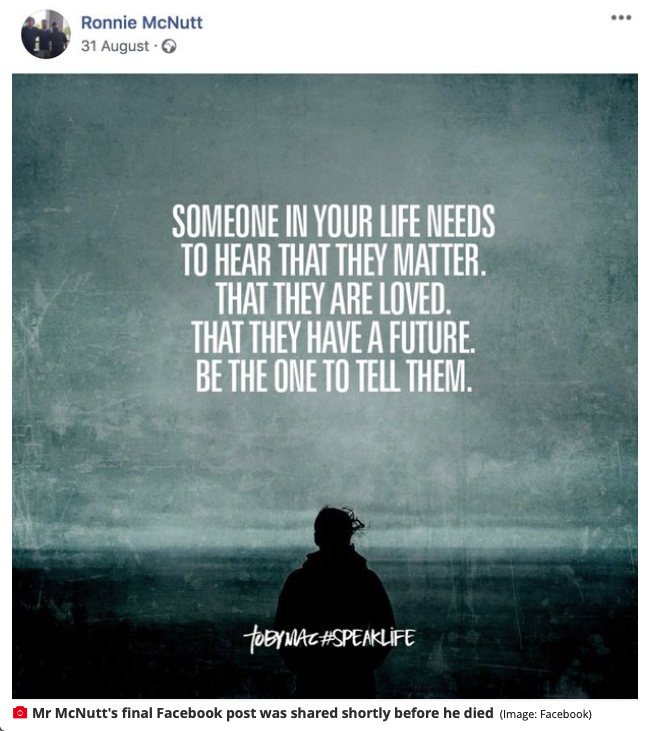Dealing with Suicidal Tendencies? Posting on Social Media Is Not Therapy

On this World Suicide Prevention Day, I wanted to write to people who hide behind the illusion of strength. They give the appearance of mental well-being by posting excellent advice, uplifting memes, and beautiful quotes, but privately they struggle with the overpowering tidal forces of suicidal depression. When that tide sweeps them away, their friends are left surprised and stunned.
As many of you know, Ronnie McNutt¹ took his own life while live streaming on Facebook last month. It was traumatic and devastating to those who witnessed it. According to his friend, Ronnie was severely drunk, so it’s easy to assume that he might not have been thinking clearly when he posted such a strong, demanding, yet earnest post before ending his own life.
What can we learn from his example?
Ronnie didn’t reach out for help. He posted on Facebook, then, while inebriated, streamed his last moments. That is such an extreme and unusual situation, you may feel you have nothing to learn at all from his actions. Yet Ronnie hid his pain behind a social media post instead of seeking help. This is what I hope to encourage others to not do.
To those of you who hide your pain behind a social media mask, I have a message for you:
Posting upbeat, inspirational posts on social media is not the same thing as getting help.
Don’t treat your social media timeline as if it’s some magic ward against the demons that eat at you. You more than others know the importance of reaching out for help. Please don’t worry about keeping up appearances. If you feel overwhelmed by suicidal tendencies, reach out to those caring and wonderful people in your support network. Find people who listen. Find people who help.
It’s been two years and five months since I last had a suicidal thought. When a suicidal impulse springs to life in my mind, my first coping strategy is to tell somebody about it. I do the opposite of hiding it! Sometimes I tell my daughters. Sometimes I tell a religious leader. I always set up an appointment with a psychologist or psychiatrist. I immediately seek help. These coping strategies have helped me for over thirty years.
Set up good habits and practice them. Don’t disguise your pain with an illusion. Posting upbeat mental health content isn’t wrong, but it is your responsibility to yourself to ensure posting on social media is not all you do to keep yourself healthy.
If you will find it helpful, please read the articles I have written over the years regarding National Suicide Prevention Month. They are filled with personal anecdotes from my own struggles with depression and suicidal depression, but also tips and ideas to help you overcome your pain.
Please don’t keep it hidden.